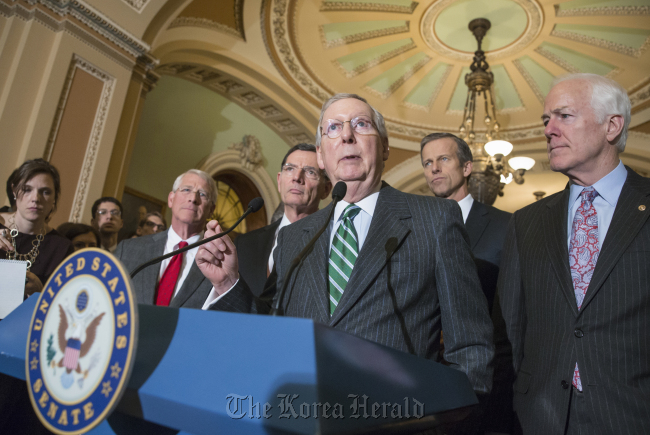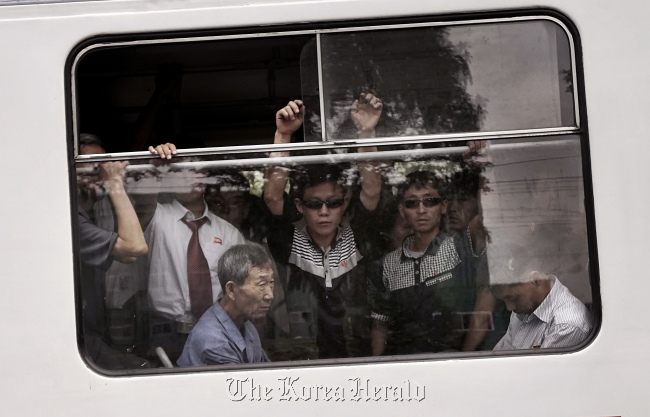The United States on Thursday put in place a package of its strongest, most comprehensive standalone sanctions yet against North Korea in punishment for its fresh nuclear and long-range missile tests, also targeting cybercrimes, human rights violations and other illicit activities.
President Barack Obama signed the North Korea Sanctions and Policy Enhancement Act into law, the White House said. The House of Representatives initially voted nearly unanimously to pass the bill about a week after the Jan. 6 underground blast and gave final approval on Feb. 12 following slight changes in line with the Senate’s endorsement.
The legislation, H.R. 757, is designed to make way for the administration to tighten sanctions on individuals and entities engaging in transactions related to Pyongyang’s nuclear and missile programs, cyberattacks, arms, narcotics and cash smuggling, human rights breaches, luxury goods buys, misuse of the global financial system and other illegitimate acts.
“The Congress seeks, through this legislation, to use nonmilitary means to address this crisis, to provide diplomatic leverage to negotiate necessary changes in North Korea’s conduct and to ease the suffering of the people of North Korea,” the text reads.
President Barack Obama signed the North Korea Sanctions and Policy Enhancement Act into law, the White House said. The House of Representatives initially voted nearly unanimously to pass the bill about a week after the Jan. 6 underground blast and gave final approval on Feb. 12 following slight changes in line with the Senate’s endorsement.
The legislation, H.R. 757, is designed to make way for the administration to tighten sanctions on individuals and entities engaging in transactions related to Pyongyang’s nuclear and missile programs, cyberattacks, arms, narcotics and cash smuggling, human rights breaches, luxury goods buys, misuse of the global financial system and other illegitimate acts.
“The Congress seeks, through this legislation, to use nonmilitary means to address this crisis, to provide diplomatic leverage to negotiate necessary changes in North Korea’s conduct and to ease the suffering of the people of North Korea,” the text reads.

The goal of the measures is to “serve to increase pressure,” White House Press Secretary Josh Earnest said before the signing, adding that the administration is “deeply concerned” about North Korea’s recent actions and provocations.
Seoul welcomed its ratification, saying it attests to Washington’s concrete resolve to take stern action against the latest provocations and will help reinforce the international community’s united response.
“As the world’s first systematic, standalone North Korea sanctions law built on bipartisan support, the legislation is expected to provide the foundation for the U.S. administration to take strong, effective steps,” Foreign Ministry spokesman Cho June-hyuck said at a news conference Friday.
“Our government, together with the international community, will take all possible measures to make North Korea abandon nuclear weapons and change itself.”
The bill was introduced by Rep. Ed Royce, chairman of the House foreign relations committee, in February 2015 in the wake of the North’s computer network hack of Sony Pictures, but had not been put up for a vote since.
While focusing chiefly on ways to deny the Kim Jong-un regime access to funds for its military programs, the act mandates the imposition of penalties on those involved in illicit business with North Korea unless a presidential waiver is given. It also requires sanctions to be levied on North Korea’s key industrial inputs, such as coal and precious minerals, if found to have been diverted for banned military uses.
Many of the ideas appear to be rooted in the steps enforced against Iran until 2013, which enabled the U.S. to sanction third-party companies and individuals for their illegal dealings with Tehran.
The latest act thus in effect carries veiled warnings mainly to China, the North’s top trading partner and economic patron, though whether Washington will actually punish Chinese entities remains to be seen.
“It is here that any new North Korea sanctions endeavor will potentially founder: how far to push North Korea’s trading and financial partners, most of whom are Chinese,” Richard Nephew, director of economic statecraft, sanctions and energy markets at the Center on Global Energy Policy at Columbia University’s School of International and Public Affairs, wrote on the 38 North blog run by the U.S.-Korea Institute at Johns Hopkins School of Advanced International Studies.
“The U.S. may be prepared to have some amount of economic and political contretemps with China over North Korea, but it is doubtful that any but the most myopic of sanctions advocates would be prepared to sacrifice U.S.-China relations on the altar of North Korea sanctions, and there are many different issues that require U.S. and Chinese engagement.”
The new law stresses the need for follow-up steps, requiring the president to brief the congressional committee on the regime’s principal foreign assets and sources of foreign income, and to provide a list of designated persons for their contribution to the proliferation of weapons of mass destruction, arms and luxury goods trade, censorship and other “prohibited conducts,” as well as a summary of diplomatic efforts to sanction and block the assets of banned North Korean banks -- all within 180 days of its effectuation and regularly afterward.
In light of the dismal living conditions in the communist state, the act calls on the secretary of state to present “specific findings with respect to the responsibility for serious human rights abuses and censorship” of Kim and other top military and ruling Workers’ Party officials.
The law also authorizes $50 million over the next five years to transmit radio broadcasts into the reclusive country, purchase communications equipment and support humanitarian aid programs.
“This new law is critically important because for the first time it sets out that the U.S. government will sanction leaders in North Korea because they abuse human rights,” Phil Robertson, deputy Asia director at Human Rights Watch, said in an email interview with The Korea Herald.
“This law contributes to a new reality where human rights concerns will not get pushed off the table when there is a crisis on security issues or nuclear proliferation in North Korea, and that‘s a huge step forward.”

The measures came as the U.S. and China are struggling to narrow the differences in their stances over the forthcoming U.N. Security Council sanctions. While Seoul calls for a “terminating resolution” and the U.S. seeks much stricter bans, such as those directed at Pyongyang’s banking and finance, China remains reluctant, apparently wary of a possible breakdown of the North Korean economy.
The sanctions discussions have unprecedentedly been drawn out for more than 40 days. The UNSC took 18 and 23 days before unveiling the final texts following the North’s second and third tests in 2009 and 2013, respectively.
Amid the heated debate, the legislation will force Kim to “make a decision of whether they want to face economic collapse or engage in real compromise,” Royce said during a forum in Irvine, California, upon its ratification.
Sen. Cory Gardner, chairman of the Senate foreign relations subcommittee on East Asia and Pacific affairs and a related bill’s author, also lauded Obama’s signing as a “major shift” in his North Korea policy.
“It is the Obama administration’s recognition that their strategic patience policy has failed and we need a new direction to stop North Korea's increasing belligerence,” he said in a statement.
“My bill provides that new policy of strength, and I’m proud that Congress put politics aside and came together to approve mandatory sanctions designed to stop the Forgotten Maniac in Pyongyang. Today, we’ve given our allies a reason to trust us, and our enemies a reason to fear us.”
By Shin Hyon-hee (heeshin@heraldcorp.com)









![[Hello India] Hyundai Motor vows to boost 'clean mobility' in India](http://res.heraldm.com/phpwas/restmb_idxmake.php?idx=644&simg=/content/image/2024/04/25/20240425050672_0.jpg&u=)








